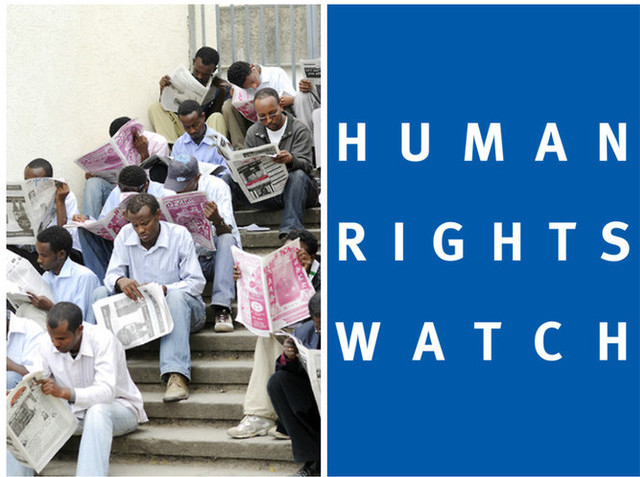 Human Rights Watch says "Legal, policy reforms crucial prior to May elections." (Getty Images and HRW)
Human Rights Watch says "Legal, policy reforms crucial prior to May elections." (Getty Images and HRW)
JANUARY 22, 2015
(Nairobi) – The Ethiopian government’s systematic repression of independent media has created a bleak landscape for free expression ahead of the May 2015 general elections, Human Rights Watch said in a report released today. In the past year, six privately owned publications closed after government harassment; at least 22 journalists, bloggers, and publishers were criminally charged, and more than 30 journalists fled the country in fear of being arrested under repressive laws.
The 76-page report, “‘Journalism is Not a Crime’: Violations of Media Freedom in Ethiopia,” details how the Ethiopian government has curtailed independent reporting since 2010. Human Rights Watch interviewed more than 70 current and exiled journalists between May 2013 and December 2014, and found patterns of government abuses against journalists that resulted in 19 being imprisoned for exercising their right to free expression, and that have forced at least 60 others into exile since 2010.
“Ethiopia’s government has systematically assaulted the country’s independent voices, treating the media as a threat rather than a valued source of information and analysis,” said Leslie Lefkow, deputy Africa director. “Ethiopia’s media should be playing a crucial role in the May elections, but instead many journalists fear that their next article could get them thrown in jail.”
Most of Ethiopia’s print, television, and radio outlets are state-controlled, and the few private print media often self-censor their coverage of politically sensitive issues for fear of being shut down.
The six independent print publications that closed in 2014 did so after a lengthy campaign of intimidation that included documentaries on state-run television that alleged the publications were linked to terrorist groups. The intimidation also included harassment and threats against staff, pressure on printers and distributors, regulatory delays, and eventually criminal charges against the editors. Dozens of staff members went into exile. Three of the owners were convicted under the criminal code and sentenced in absentia to more than three years in prison. The evidence the prosecution presented against them consisted of articles that criticized government policies.
—
Join the conversation on Twitter and Facebook.

























